From the first woman to plant wine grapes in the Lone Star State and one who employed her gardening expertise to grow the local wine boom, to two transplants making names for themselves in the male-dominated wine industry, these enterprising ladies are proving that, in Texas, in vino veritas—in wine, there is truth.
By Mauri Elbel, Photos by Annie Ray
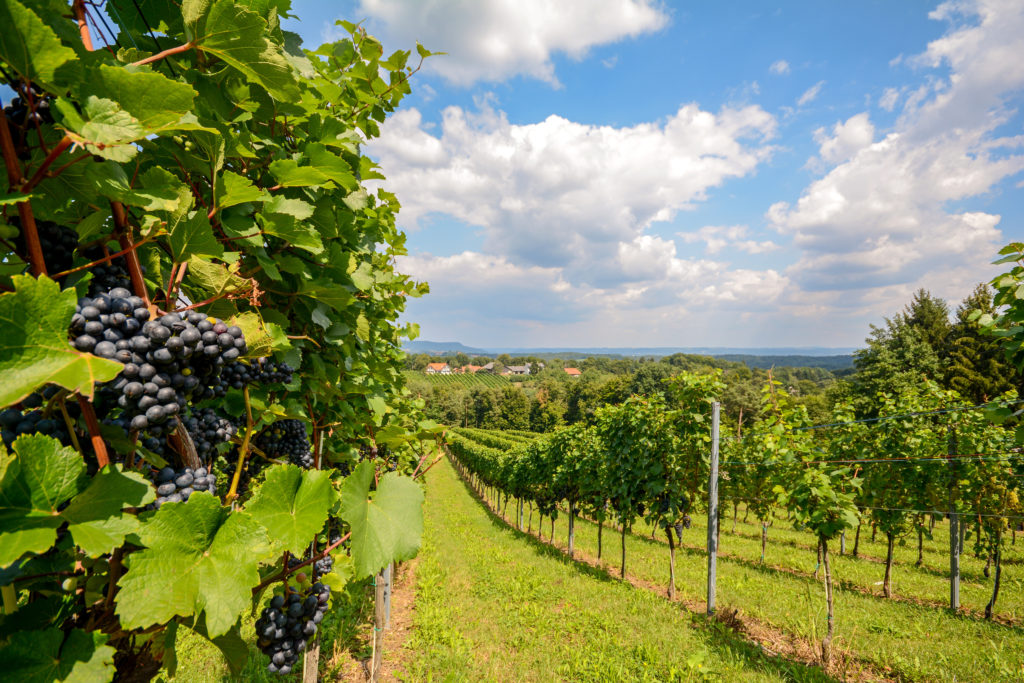
From pioneering groundbreakers responsible for putting the Hill Country wine region on the map to up-and-coming winemakers propelling it into the future, meet four women behind Central Texas’ burgeoning wine industry. Despite being the minority in the largely male-dominated field of winemaking, women have long been making strides in Central Texas’ wine scene. From the women who spearheaded the industry here decades ago to forward-thinking females paving the path toward its continued success, we can all raise a glass to these four women who have been planting vines, stomping grapes and swirling glasses in the Lone Star State.
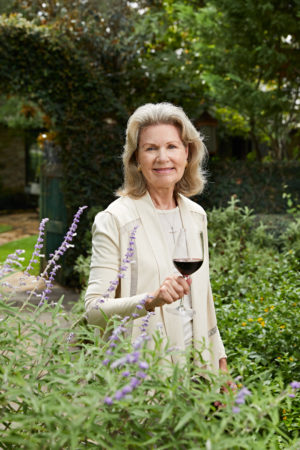 THE MATRIARCH
THE MATRIARCH
Susan Auler – Co-founder and co-owner of Fall Creek Vineyards
Some 45 years ago, inspired by a trip to France in search of cattle for their family ranch, Susan and Ed Auler returned home to the Hill Country with an unexpected dream: to make Texas an internationally recognized wine region.
“This is certainly the last thing either of us thought we would be doing,” Susan Auler admits.
The couple met at the University of Texas, where she majored in interior design and he went on to pursue his law degree. After getting married, they took over the operation of his family’s cattle ranch.
“Ed was [the]fourth generation to operate Fall Creek Ranch, and now our two sons, Chad and Mark, are the fifth generation,” she says. “Because ranching isn’t always a lucrative industry, we were pondering ways to make the land more income-producing.”
In 1973, the couple took off for France to check out French breeds of cattle to potentially cross with their Angus herd. The couple did spend two days visiting a French cattle operation, but they followed it with 19 days touring the French wine country. They sipped from Reims to historic Burgundy to the beloved Rhône Valley across the South of France to Bordeaux and the stunning Loire Valley.
“Interestingly enough, as we were driving across the South of France, Ed said, ‘I think this looks a lot like the Texas Hill Country. I wonder if anyone has thought of growing grapes in Texas,’ ” Susan Auler recalls.
Taking home a whirlwind education and a new and deep appreciation of French wines as souvenirs, the Aulers decided to take a risk. They dedicated a 1/4- acre corner plot of their Central Texas ranch to an experiment: growing wine grapes. With this, the Aulers became groundbreakers, the first to plant grapes in the state and the first to establish a winery in the Texas Hill Country. They planted those first vines in 1975, began buying up 400 acres of land adjacent to the ranch and by 1980, Ed Auler had to quit his law practice so the couple could focus on grape growing full time.
“Soon, we were up to our necks in grapes and Ed didn’t have time to practice law anymore, so we decided to jump in full force,” Susan Auler says. “And that was the beginning of Fall Creek Vineyards.”
Operating under the same name that has been part of their family heritage for generations, the Aulers set out to create a new Texas tradition. As one of the original growers of Texas wine grapes, Susan Auler has spent nearly half a century pouring her heart and soul into establishing a viable Texas wine industry. She was included in the Top 50 People in the Wine World list by wine-industry trade magazine Wines & Vines, and went on to found the Texas Hill Country Wine & Food Festival in 1986, with the goal of growing awareness about the Hill Country as a bona fide wine region. Within four years, Ed Auler helped solidify the Texas Hill Country as a known wine region when the U.S. government granted his application for the Texas Hill Country appellation.
Known as the first family of Texas wines, the Aulers continue to focus on 100 percent terroir-driven wines, rooted in the best Texas soils and crafted by their talented winemaking team. In the mid-1980s, André Tchelistcheff, the late world-renowned winemaker and consultant who helped put California on the world wine map, became Fall Creek Vineyards’ consultant after tasting the Aulers’ first cabernet sauvignon and exclaiming, “Plant more!” In 2013, their plan to create world-class wines at Fall Creek Vineyards started to become a reality when Sergio Cuadra, a highly successful Chilean winemaker, became the director of winemaking. Phil Price, who worked most recently at Brand Napa Valley under celebrated winemaker Philippe Melka, joined Fall Creek Vineyards as a winemaker in 2016.
Susan Auler says these winemakers have been instrumental in carefully matching the grape to the terroir—the natural environment in which wine grapes are grown—to create Fall Creek Vineyards’ premier wines, which compete with the best wines of the world, thereby securing the Aulers a place at the most esteemed tables, including several presidential inaugurations and an array of state dinners. But anyone driving past their original winery in Tow, Texas, or their idyllic second Hill Country winery, sitting on 17 acres in Driftwood, Texas, across from the legendary Salt Lick BBQ, can enjoy them too.
“From the very beginning, we wanted to stand shoulder to shoulder to the best wines in the world,” Susan Auler says. “We are both native Texans and proud of our heritage and wanted to be a part of the world winemaking map. It may have been the last thing we thought we would be doing, but it has been a fabulous life focus. It’s been such a wonderful, enriching experience for Ed and I and our two sons.”
THE AUSTINTINA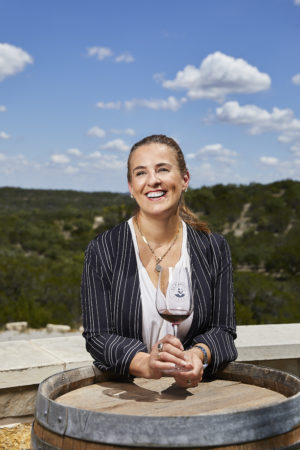
Eugenia Sewell, Sommelier and co-owner of El Gaucho Winery
Lo mejor esta por venir. Translation: The best is yet to come. Never did those words mean more to Eugenia Sewell than in 2001, when she found herself divorced with two toddlers during Argentina’s economic crisis and with no job or income in sight. Despite the challenges of providing as a single mother, she was determined to follow her passion and pursue a career in winemaking. Today, she is a local entrepreneur, Argentinian sommelier and co-owner of El Gaucho Winery in Spicewood, Texas.
Sewell was born in Mendoza, Argentina, and raised in Buenos Aires. Her interest in winemaking stems from her childhood, when she spent summers at her grandparents’ vineyards in Southern Mendoza. She enrolled at Escuela Argentina de Vinos to become a professional sommelier, completing the six-year program in four years, which included a four-hour commute three times a week from her home to the school in Buenos Aires.
“It’s hard, looking back, to believe I did all of this, but I needed to do what I needed to do,” says Sewell, who sold her jewelry and furniture to purchase food and diapers when she was no longer able to access her money from the bank during the country’s trying economic times.
“People said going into thewine business during a financial crisis—and trying to pursue a career in a male-dominated industry—was crazy. But it was what I wanted to do.”
Sewell was asked to teach classes at the college during her last year, and after graduation, she worked for a number of well-known wineries in Argentina, taught wine-appreciation classes and began a Saturday morning wine-focused radio show in Buenos Aires. She joined a consulting group focused on working with wineries to market their wines and assisted individuals and companies looking to purchase wine, wineries and vineyards. Soon after, she was selected as the honorary sommelier for the Office of the President of Argentina.
“When I began, I knew the wine business in Argentina was male-dominated and it was uncommon for women to be in the wine industry,” Sewell says. “My education has been a continual process, and I noticed when I started to give classes in Argentina, the women I taught had a desire to become professionals in the wine business. If you’re resilient and want to be more involved, you can do anything you put your mind to.”
In 2007, she met her husband, Bennett Sewell, a native Austinite, during his travels to Mendoza and Buenos Aires. Bennett Sewell hired her as his consultant, they fell in love, got married and together, they purchased two vineyards totaling 55 acres in the Mendoza wine country, one located in Luján de Cuyo and the other in Valle de Uco. After seven years in Mendoza, they relocated to the Texas Hill Country with their young son. Three years ago, Eugenia Sewell designed the winery she always wanted: El Gaucho Winery (“Gaucho” is a term for an Argentinian cowboy.), where they pour and sell their Argentinian wines. At El Gaucho Winery, they serve the wine they make from their two vineyards, Finca Austin and Finca La Passion, for their two labels, Tierra de Gaucho and Estado Natural, offering locals an authentic taste of Argentina.
“We’ve always wanted to make the connection between Texas and Argentina, which both have big cowboy cultures,” Eugenia Sewell says. She oversees winemaking operations in Mendoza and shares the day-to-day operations of El Gaucho Winery with her husband. “We try to have a little bit of Argentina here in Austin. We call it ‘Austintina’ because we are bringing something from the West of Argentina to the heart of Texas.”
El Gaucho Winery, located about 25 miles from downtown Austin, actually bears a striking resemblance to the parts of Mendoza where their wines are made, with the Hill Country’s high and low elevations, arid landscape and brush lands. Perched atop a hill and off the beaten path, the Texas winery has become a family-friendly gathering spot where people can relax and enjoy the vistas, forget their troubles and feel as if they’ve been transported to Argentina when they sample nearly a dozen Argentinian wines spanning malbec to sparkling pinot noir to torrontes, and authentic dishes, including empanadas, provoleta and the Argentinian-style steak-and-barbecue meal known as asado.
“Every bottle of wine has a history inside of it,” Eugenia Sewell says. “There’s the story behind it, a little magic in it. Just like a book, you open it up and it can take you anywhere in the world. Wine is the same. In Argentina, we call it tertulia. This is what happens at our winery; you forget about things, you socialize, you take time for yourself and you feel real connections.”
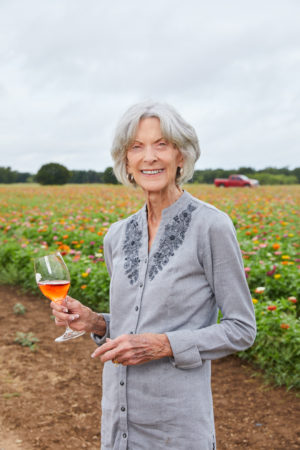 THE SOIL WHISPERER
THE SOIL WHISPERER
Bunny Becker, Co-founder of Becker Vineyards
The Beckers didn’t set out to establish a winery when they embarked on their search for a modest Hill Country retreat nearly 30 years ago. Rather, Bunny Becker, a speech therapist turned homemaker, and her husband, Dr. Richard Becker, a fourth-generation Texan and endocrinologist, were simply searching for a weekend getaway.
“We wanted 1 acre and no yardwork,” Bunny Becker laughs. “But the cabin we found had been there for 150 years, and the German family we bought it from didn’t want to break up the land.”
The Beckers purchased the cabin in 1989 and, along with it, 46 acres of raw land characterized by what the Beckers describe as “fallow fields of deep sand and Precambrian granitic soils located 1,500 feet above sea level.” The couple, who had traveled abroad extensively and long been passionate about culinary and wine experiences, began patronizing a few of the local Texas wineries.
“Richard always had a garden, and people were growing grapes all around us,” Bunny Becker recalls, noting some already established neighboring wineries included Grape Creek Winery, Sister Creek Vineyards and Bell Mountain Winery.“We had tasted wines of the Hill Country and thought they were very good. We thought we might like to do that.”
The Beckers’ sprawling property, located in bucolic Stonewall, Texas, was already ripe with native mustang grapes, a long beloved component of the local German heritage. As the Beckers were avid gardeners and admirers of French-style wines, their dream of a commercial vineyard naturally began to take shape and soon, Becker Vineyards was born. From the beginning, it was a family venture, with them planting their first grapes in 1992 alongside their three children.
“We ordered the grapes from California and they arrived on the Saturday of spring break, so my son and I planted a good part of it,” Bunny Becker says. “We planted for a solid four hours, which was a lot like doing around 1,400 squat jumps. Then the men we hired arrived around noon to plant the rest.”
The following year, in 1993, the Beckers planted 30 more acres. Their first harvest, in 1995, laid the foundation for what is now an internationally recognized winery producing vintages that have been served everywhere from the White House to the James Beard Foundation in New York City. Today, Becker Vineyards employs more than 50 people and cultivates approximately 42 acres of estate fruit, with two additional vineyards in other parts of Central Texas bringing the Beckers’ vine acreage to a total of 84 acres. Becker Vineyards features nine harvest-ready varietals at the serene Hill Country winery.
An Old World feel flourishes throughout Becker Vineyards’ winery and tasting room, where people come from near and far to sample sips of petite sirah, cabernet sauvignon, malbec and cabernet franc, to name just a few. The Beckers’ philosophy is and always has been to focus on promoting Texas wine and Texas-grown fruit— and it’s paid off. They currently contract with more independent Texas grape growers and crush more Texas fruit than any other winery in the state.
Bunny Becker attributes her company’s monumental success to a variety of factors. First, the couple was determined to make wines they wanted to drink. Second, she thinks the timing was right: People, especially from nearby bigger cities like Austin and San Antonio, were becoming increasingly interested in wine. And finally, she says they’ve always made a point to treat everyone, from their guests to their staff, with welcoming arms.
“I wanted to treat people like they were coming to our house,” Bunny Becker says. “We have always been welcoming and not uppity or pretentious, and we have the most wonderful people working for us. If someone working for us ever has to leave, it is so sad. It is like a divorce.”
It could also be argued that Becker Vineyards’ success during the last quarter century is largely due to Bunny Becker’s willingness to take risks, whether that meant being the first in Texas to plant viognier grapes or going against seasoned advice to harvest what she loved.
“We had visited France and tasted their lovely wines and I especially loved the viognier. I wanted to plant it because I thought the terrain here was so similar to the terrain there,” Bunny Becker says, adding that a consultant they hired from Temecula, Calif., balked at the idea. “We planted it anyway. We were the first to plant it in Texas, and it has been one of our greatest sellers. People just loved it.”
The Beckers’ very first vintage of viognier also garnered the attention of Robert Mondavi, who later shared with them the key to making good wine: Never cut corners when it comes to winemaking. The Beckers took his advice to heart and today use 3,400 barrels to produce the very best wines possible. Indeed, Becker Vineyards is the largest purchaser of French and American oak barrels in the Lone Star State. Just this year, Becker Vineyards won four Double Gold medals at the San Francisco Chronicle International Wine Competition for its 2015 cabernet sauvignon reserve (Wilmeth family), 2015 cabernet sauvignon reserve (Canada Family), 2016 reserve merlot and 2014 Raven.
“It gets bigger every year,” Bunny Becker says. “We started with about 1,500 cases per year and I thought we would never sell that much wine. I told Richard he had better start drinking! Now we make about 120,000 cases per year.”
The Beckers still maintain their daily lives in San Antonio, but you can find them at the winery every Saturday, filling their weekend with Hill Country bliss just like they set out to do all those years ago.
THE COMMUNITY BUILDER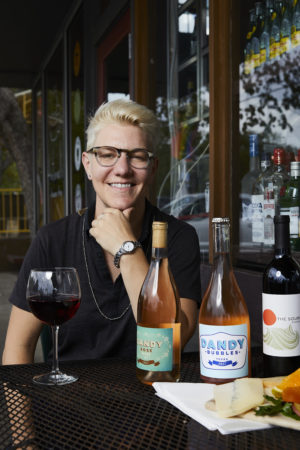
Rae Wilson, Founder of Wine for the People, sommelier and winemaker
Before making her mark on the Texas Hill Country wine scene, Rae Wilson spent more than two decades immersed in the restaurant industry, working as a server and bartender to help pay the bills for her more creative (and less lucrative) artistic pursuits. When she became interested in wine, the St. Louis native earned an advanced certification from the Wine and Spirits Education Trust and became a certified sommelier with the Court of Master Sommeliers.
“After studying wine, I realized that I wanted to complete that circle and I wanted to learn more about production,” Wilson recalls.
She became certified in Napa, Calif., and decided to stay for a harvest. She landed a harvest internship in the area at Artesa Winery, which sits at the southern tip of Napa Valley, and after working through the harvest, she was offered a cellar position.
“Working in a cellar is very industrial and very physical work,” Wilson says. “You work until it is done; there are no hours and it is a very physically taxing and extremely challenging time of the year, but I loved it the same. There aren’t many women in the cellar. Women can definitely do it, but it is rarely encouraged, which is why there are still such low statistics of women winemakers. You can learn in the classroom, but getting out in the cellars and getting those positions is a bit harder.”
Despite the challenges, Wilson wanted to do it again, this time in a more remote locale. She took on cellar positions in various areas of Portugal in 2009, working two harvests in one year because of the vastly different climates.
“I wanted to go somewhere much more traditional, so I decided to go to Portugal because I had a desire to learn their traditional methods of winemaking,” Wilson says. “Portugal’s wines are just incredible and had always grabbed me, yet at the same time, they were always kind of overlooked, so there was a mystery around them and I was really intrigued.”
After the harvests, Wilson took notice of the flourishing Texas wine industry and headed to the Lone Star State to pursue her own projects. In 2010, she created Wine for the People, cultivating community through wine culture and events for a greater impact.
“I never would have thought I would be making wine in Texas,” she says. “But it’s incredible to feel like you are contributing to a young region that’s still establishing itself. We are all still discovering and exploring that story as it is unfolding. And that, to me, is extremely exciting.”
For Wilson, wine is inherently about community. Wine, as she puts it, is what connects the earth under our feet to the hands that make it and those who share it.
“As Texas continues to establish and emerge as a wine state, a really big component is that people here identify with that and feel connected to that,” Wilson says.
Wilson currently has two production projects: Dandy Rosé, a boutique dry rosé that’s 100 percent grown and produced in Texas, and The Grower Project, which bottles single-site, high-quality wines made from 100 percent Texas grapes and focuses on telling the stories of the winemakers behind them.
“Every bottling we do is a single-vineyard bottling, so we work with growers around the state and do bottlings just off that site and tell the stories of what’s unique about the site and the growers,” she says. “The more familiarity we have with the names of the people and the places where the wine comes from, the more it will help build the fabric of what the industry can grow from.”

